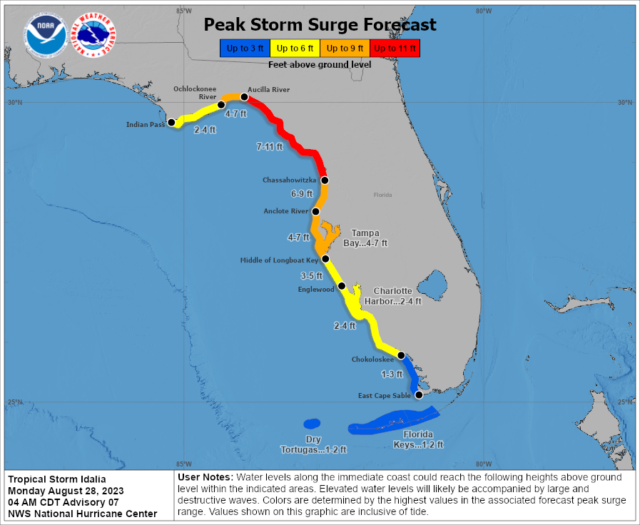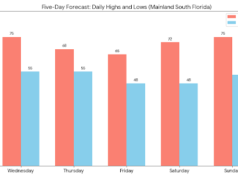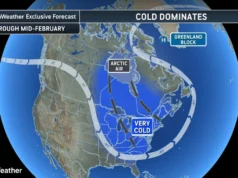
As Tropical Storm Idalia churns toward Florida, insurance experts at AAA – The Auto Club Group are providing important advice to help residents prepare their families and property.
“Now is the time to gather supplies, fortify your home and document your belongings,” said Jennifer Pintacuda, President of AAA’s Florida-based insurance providers. “It’s also important to collect your insurance policy information and phone numbers for your agent and provider, so you’ll know who to contact in the event you need to file a claim.”
AAA provides the following insurance advice:
- Review your home insurance policies. Contact your provider to ensure you have adequate coverage for any damages. If you do not have flood insurance, it’s too late to get a new policy for this storm.
- Check your auto insurance policy to ensure you have “comprehensive” coverage. This helps with vehicle damage like flooding or if a tree falls on it.
- Store important documents in a portable waterproof container. Documents could include insurance policy information, birth certificates, social security cards, and more.
- Take Inventory. Document your belongings by walking through your home with a video camera or smart phone. Keep a record of large purchases including the cost of the item, purchase date, and model and serial numbers.
- Strengthen your home. Trim trees near your house. Ensure you have materials to make sand bags and board up windows, if necessary. Bring in loose items like patio furniture, bikes and children’s toys – which could all turn into dangerous projectiles in strong winds.
Develop an Evacuation Plan and Be Ready to Execute It
A 2023 survey of Floridians found that one-in-five (20%) would evacuate their home for a Category 2 storm or higher. More than a quarter (27%) would leave for a Category 3 hurricane or stronger.
Meanwhile, almost a quarter 24% of Floridians say they’d ignore evacuation orders. The top reasons they’d stay: in case there’s damage they can repair (40%), can’t bring their pets (30%), and believe the storm will turn away from their direction (22%).
“Staying home in the path of a dangerous storm is not worth the risk,” Pintacuda said. “Having adequate insurance coverage should give you the peace of mind in evacuating, knowing that any property damage you sustain would be repaired.”
AAA’s Evacuation Advice
- Identify multiple destinations in case the storm shifts or roads are closed.
- Reserve a hotel room early, if needed. Hotels along evacuation routes often fill up fast due to high demand. If you are traveling with pets, be advised that some properties may loosen restrictions to be more accommodating to evacuees.
- Pack important documents like insurance policies, marriage and birth certificates.
- Bring enough food, water and supplies for each family member, including pets.
- If you are evacuating, leave early. Last-minute evacuees often find congested highways and long lines at filling stations, which could result in temporary fuel outages.
- Follow the advice of local authorities and leave if instructed to.
- Before you go, turn off all utilities and unplug every electrical item in the home, to minimize the risk of a fire.
Safety Tips for Drivers
AAA urges drivers to be patient and courteous of others on the road. Tensions are likely to be high with an approaching storm, but getting in a crash would only make matters worse.
AAA provides the following tips for drivers:
- Leave early so you are not in a rush
- Avoid distractions while driving
- Slow down
When driving in the rain, AAA advises:
- Increase your following distance
- Turn your headlights on
- Turn your hazard lights off
- Avoid using cruise control
- Avoid flooded areas
- If poor visibility, pull over to a safe place and wait until the rain eases up
Demand Spikes Can Lead to Temporary Fuel Outages
In the coming days, it’s possible that gas stations could temporarily run out of fuel, due to an influx in demand from evacuees or people topping off their tanks and filling spare gas cans. However, drivers should remember that these outages are temporary.
Gas stations are not connected to an underground pipeline. Just like your vehicle, each gas station can only hold so much fuel at a given time. That fuel is stored in tanks underground. Once those tanks are empty, retailers bag the pumps and wait for the next delivery truck. Sometimes that can be the same day, sometimes longer. It can vary.
Florida’s gasoline is primarily provided by refineries in Texas, Louisiana, and Mississippi. That gasoline sails into Florida’s ports and then is picked up by tanker trucks and delivered to area gas stations. Fuel deliveries should continue until the weather conditions make it unsafe to do so.
Once the storm passes and the ports reopen, shipments of gasoline will begin flowing into the state again. Gasoline can also be driven over from surrounding counties or states that are not impacted by the storm.
“The bottom line is, don’t panic about gasoline supplies, just take what you need,” Jenkins continued. “The state makes it a priority to keep gasoline shipments going as long as it’s safe to do so. Once the storm passes, shipments will resume as soon as possible.”
Gas Price Gouging
If gas prices were to increase as this storm approaches – even after a state of emergency was declared – AAA is often asked whether that is considered “price gouging”?
During a storm-related state of emergency, retailers like gas stations are prohibited from significantly raising prices beyond what they’ve charged in the past 30 days.
The exception is if the cost of obtaining that commodity increases for the business owner. For example, if oil prices unexpectedly surged this week and wholesale gasoline prices spiked, that could raise the price for retailers to obtain their next shipment of gasoline, enabling them to pass along the added expense to consumers.
It’s important to note, that even though the state average is $3.71 per gallon – pump prices can still vary dramatically depending on the city or street.
Even still, if drivers suspect foul play, they’re encouraged to report it. For more information on price gouging and how to report it, visit the Florida Attorney General’s website.
About the AAA Consumer Pulse™ Survey
The AAA Consumer Pulse™ Survey was conducted online among residents living in Florida from April 20 – 27, 2023. A total of 400 residents completed the survey. Survey results asked of all respondents have a maximum margin of error of ± 4.9% points. Responses are weighted by age and gender to ensure a reliable and accurate representation of the adult population (18+) in Florida.
About AAA – The Auto Club Group
The Auto Club Group (ACG) is the second largest AAA club in North America with more than 14 million members across 14 U.S. states, the province of Quebec and two U.S. territories. ACG and its affiliates provide members with roadside assistance, insurance products, banking and financial services, travel offerings and more. ACG belongs to the National AAA federation with more than 62 million members in the United States and Canada. AAA’s mission is to protect and advance freedom of mobility and improve traffic safety. For more information, get the AAA Mobile app, visit AAA.com, and follow us on Facebook, Twitter and LinkedIn.
Disclaimer
The information contained in South Florida Reporter is for general information purposes only.
The South Florida Reporter assumes no responsibility for errors or omissions in the contents of the Service.
In no event shall the South Florida Reporter be liable for any special, direct, indirect, consequential, or incidental damages or any damages whatsoever, whether in an action of contract, negligence or other tort, arising out of or in connection with the use of the Service or the contents of the Service.
The Company reserves the right to make additions, deletions, or modifications to the contents of the Service at any time without prior notice.
The Company does not warrant that the Service is free of viruses or other harmful components












